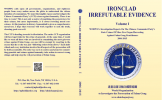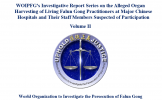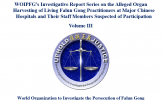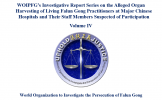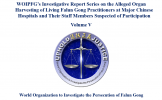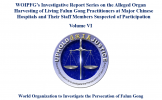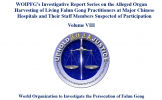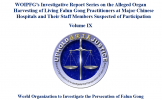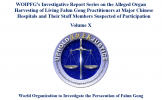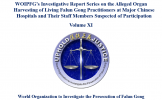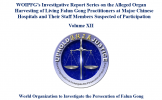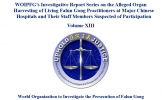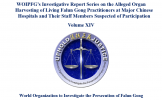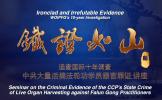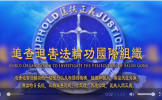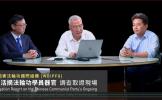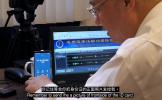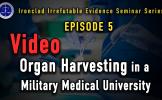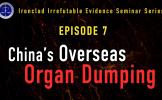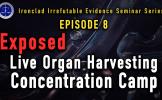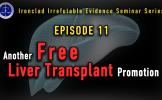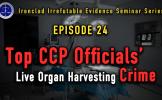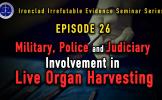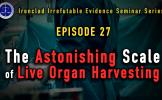2023 Report of WOIPFG’s Investigation into CCP’s Ongoing Organ Harvesting from Living Falun Gong Practitioners
Preface
According to our investigations during the COVID-19 lockdowns in China, in the three-year pandemic period, China’s organ transplant industry was not severely impacted by the Chinese Communist Party’s (CCP) “zero-COVID” policy. Organ transplant clinics across China were receiving patients as usual, and multiple hospitals claimed that they had ample organ supplies. Under the strict control of city lockdowns and road closures, many people died of starvation and lack of access to medical care. However, surprisingly, the supply of organs was not affected. This shows that the organ transplant industry does enjoy privileges in China, because only by going through the official “green channels”, was it possible to transfer organs at any time without “yellow health codes” or “pop-up windows”, which were means of government-implemented blockage.
After the COVID-19 lockdowns were lifted in 2023, World Organization to Investigate the Persecution of Falun Gong (WOIPFG) launched a new round of follow-up telephone investigations from February 2 to March 21, 2023, on dozens of organ transplant experts, professors, directors and chief surgeons from some of the hospitals suspected of harvesting organs from living Falun Gong practitioners. Thirty-six of these phone investigation recordings have been selected and published below.
These investigations involved 32 hospitals in 23 provinces, central government directly-controlled municipalities and autonomous regions. Except for Zheng Shusen’s Shulan Hospital, which is a private entity, the other 31 hospitals are all state-owned Class A tertiary hospitals. The subjects of investigation were mainly hospital presidents, directors of organ transplant departments/centers, and chief surgeons.
Investigation results:
The CCP’s crime of live organ harvesting is still ongoing, and living human organ donor banks still exist. Some doctors said outright that they had multiple liver donors on hand. How can major organs such as livers and kidneys be stored without banks of organs from living humans? The bigwigs in the CCP’s organ transplantation industry had no qualms about admitting that they used Falun Gong practitioners’ organs in the past, and there was no sense of guilt in their words.
Considering that the CCP’s persecution of Falun Gong is still ongoing, the Kidney Transplant Department of Xijing Hospital Affiliated with the CCP’s Fourth Military Medical University was still harvesting organs from living Falun Gong practitioners as of 2020[1], and Falun Gong practitioners are suspected to be the organ “donors” during our 2023 investigations, we have reasons to believe that the CCP has not ceased harvesting organs from living Falun Gong practitioners.
We would like to draw your attention to the fact that massive volumes of organ transplants have been taking place in China for many years and are still ongoing with steady growth. Additionally, the organ sources are completely unknown. So the possibility that the industry of harvesting organs from living people has been socialized cannot be ruled out.
Our investigations reveal that organ transplants, mainly liver and kidney transplants, are being extensively performed throughout China. At the same time, the organ wait times are short, and there is an ample supply of organs. The cities with the largest numbers of organ transplant cases include Beijing, Tianjin, Shanghai, Hangzhou, Guangzhou, Zhengzhou and Wuhan. The organ transplant business is also expanding rapidly in Hainan, Shenzhen and Xiamen, with Hainan Island, in particular, enjoying organ transplantation privileges.
During the period of the “Zero-COVID” policy, all industries slowed down, except for the CCP’s organ transplantation industry, showing that this industry enjoys a special status in China. After the lockdowns were lifted, there has been an increase in the availability of organs, exhibiting a gradual upward trend.
The wait times for liver and kidney transplants are approximately two months, which is the norm in hospitals across China. Behind the simultaneous harvesting and transplantation of organs is organ harvesting from living donors, which has almost become the norm in various hospitals.
The organs of infants and young children have been commonly used for adult organ transplants in many Chinese hospitals for a long time. Many organ transplant surgeons do not perceive this practice as unethical or immoral. The restriction imposed by the CCP authorities on using children’s organs for adults primarily stems from the shortage of organs to meet the transplant needs of other children.
The investigators also inquired about susceptibility to disease and mortality following organ transplantation. After an organ transplant surgery, in order to prevent the rejection of the allogeneic organ(s) by the body’s immune system, the patient would require lifelong immunosuppressive treatment and the use of immunosuppressants to reduce rejection reactions. However, this approach is a double-edged sword, as it significantly weakens the patient’s immune system, making the patient prone to infections and complications. During the COVID-19 pandemic, organ transplant recipients were considered a high-risk group. If they contracted COVID-19, it posed an extremely dangerous situation for them. Consequently, even experts and professors advocating for organ transplantation struggle to justify this aspect.
The number of Chinese hospitals qualified and authorized to perform organ transplants is continuously increasing, and the actual number of organ transplant cases in China is growing each year. However, the sources of organs are becoming increasingly opaque. Various organs of unknown origin are labeled as donated organs by organ procurement organizations (OPOs) and are being marketed both within China and internationally.
I. Living Organ Donor Banks and Organ Harvesting from Living Donors
Most of the individuals under investigation stated that the organs were essentially excised in their own hospitals, and the organ removals were performed simultaneously with the organ transplant surgeries. This indicates that these hospitals have access to living human “donors”, and then the organs can be harvested from the “donors” while they are still alive.
Zhang Zhen, a liver transplant doctor at Beijing You An Hospital, Capital Medical University: “The ‘donors’ are allowed to read books every day as their primary activity, and they typically sleep until after 3 a.m.” (Based on this description, the “donors” are suspected to be Falun Gong practitioners detained in organ banks).
(Recording 11. Download: MP3; transcript download: pdf11)
Wang Xin, director of the Liver Transplantation Department at the Affiliated Hospital of Qingdao University: “We currently have several donors available. I may have several O (blood type) and A (blood type) donors right now, but there are no B (blood type) or AB (blood type) donors at the moment.”
Note: Based on the description of the organs, the “donors” are suspected to be living individuals detained in organ banks. This suspicion arises because organs from regular donors are typically procured randomly, and it is impossible to reserve them. Organ donations from deceased individuals in accidents or patients whose resuscitation attempts have failed are determined at the time of the accident or death, and these organs are then urgently removed. Therefore, it is even more unlikely to have such organs reserved in advance. (The permissible warm ischemia times for transplantation are 3 to 4 minutes for hearts, 5 to 8 minutes for livers, 30 minutes for kidneys, and 24 hours for bones and corneas.[2])
(Recording 21. Download: MP3; transcript download: pdf21)
Qiu Wei, associate professor and deputy director of the Liver Transplantation Center at the First Hospital of Jilin University: The liver sources are all from Jilin Province and then come to our hospital (for us) to procure (their livers). (Recording 29. Download: MP3; transcript download: pdf29)
Dr. Fu from the Liver Transplantation Office of the Affiliated Hospital of Guiyang Medical College: “Organs are sourced from people ranging from teenagers to individuals in their 40s or 50s, and you can choose the organs (that you want).”
(Recording 17. Download: MP3; transcript download: pdf17)
II. The use of Falun Gong practitioners’ organs is still suspected
Dr. Zhang Zhen from the Department of Liver Transplantation at Beijing You An Hospital, Capital Medical University: “The donors are allowed to read books every day as their primary activity, and they typically sleep until after 3 a.m. (Based on this description, the donors are suspected to be Falun Gong practitioners detained in organ banks). This is very difficult...that is…you have to provide for them… (Organ donors live in captivity).”
(Recording 11. Download: MP3; transcript download: pdf11)
Gao Yi, director of the Hepatobiliary Surgery Department at Zhujiang Hospital of Southern Medical University: “Now it’s all citizens’ posthumous organ donations. They are all patients who died of a disease. For instance, organ donations after brain death. They are not healthy people, unlike before, right? There were (organ donors obtained) from judicial channels (in the past).”
(Recording 6. Download: MP3; transcript download: pdf6)
III. Organ wait times are extremely short
The individuals under investigation typically claimed that the wait times for liver sources were usually around two months. If a follow up question was asked, “Can it be shortened to one month or half a month?” They would ask the investigator to come to their hospitals to see them first, and they would talk about it in person. With luck, a liver might be obtained within 1 to 5 days.
Dong Nianguo, director of the Heart Transplant Center at Wuhan Union Hospital: “A surgery can be arranged within 3 to 5 days.”
(Recording 2. Download: MP3; transcript download: pdf2)
Gu Jinyang, director of the Liver Transplantation Center at Wuhan Union Hospital: “We can try our best to schedule a liver transplant surgery in half a month.”
(Recording 5. Download: MP3; transcript download: pdf5)
Chen Xiaoping, director of Liver Transplantation at Wuhan Tongji Hospital: “In general, the wait time is 10 days or half a month, and the fastest may take about one week.”
(Recording 19. Download: MP3; transcript download: pdf19)
Guo Wenzhi, director of the Department of Hepatobiliary Surgery at the First Affiliated Hospital of Zhengzhou University: “Waiting for an organ transplant takes one month and a half. We will try our best to shorten it to one month.”
(Recording 1. Download: MP3; transcript download: pdf1)
Yang Zhanyu, a professor from the People’s Liberation Army (PLA) No. 301 General Hospital in Beijing: “At Tsinghua Chang Gung Hospital, you may not need to wait for a month. Maybe (you can do the surgery in) three or four weeks.”
(Recording 28. Download: MP3; transcript download: pdf28)
Dr. Fu from the Liver Transplantation Office at the Affiliated Hospital of Guiyang Medical College: “(The surgery) could be performed in one to two days, or in one to two months. In most cases, it should be performed within two to three weeks.”
(Recording 17. Download: MP3; transcript download: pdf17)
Dr. Chen from the Affiliated Hospital of Guizhou Medical University (formerly Guiyang Medical College): “The wait time for the liver donor is one to two days, if it is fast, and one to two months, if it is slow.”
(Recording 18. Download: MP3; transcript download: pdf18)
Chen Huanwei, director of the Department of Hepatic and Pancreatic Surgery at the First People’s Hospital of Foshan: “A liver transplant surgery can be arranged in about a month.”
(Recording 20. Download: MP3; transcript download: pdf20)
Wang Xin, director of the Liver Transplantation Department at the Affiliated Hospital of Qingdao University: “In terms of type B blood, if you wait for a week or two, there shouldn’t be a problem (finding a liver).”
(Recording 21. Download: MP3; transcript download: pdf21)
Li Chuanyun, deputy director of the Liver Transplantation Department at Beijing You An Hospital, Capital Medical University: “A surgery can be arranged within one month.”
(Recording 12. Download: MP3; transcript download: pdf12)
Zhou Jian, director of the Department of Liver Transplantation at Zhongshan Hospital Affiliated to Fudan University: “A surgery can be arranged in about a month.”
(Recording 8. Download: MP3; transcript download: pdf8)
Professor Fu Zhiren, director of the Liver Transplantation Department at Shanghai Changzheng Hospital: “For a liver transplant, the wait time is one to two months, but we can try to shorten it to half a month.” Nowadays he does a lot of surgeries at Ruijin Hospital.
(Recording 7. Download: MP3; transcript download: pdf7)
IV. The hospitals’ organ transplant volumes are large
Doctor on duty at the Organ Transplantation Center of the First Affiliated Hospital of Anhui Medical University: “There are relatively more liver sources now, and the liver sources are gradually increasing.”
(Recording 22. Download: MP3; transcript download: pdf22)
Professor Liu Hongming, Department of Hepatobiliary Surgery, Chongqing Daping Hospital, Third Military Medical University: “Regarding liver sources, we have done a lot (of surgeries) recently.”
(Recording 32. Download: MP3; transcript download: pdf32)
Dong Nianguo, director of the Heart Transplantation Center, Wuhan Union Hospital (affiliated to Tongji Medical College, Huazhong University of Science and Technology): “A surgery can be arranged in three to five days. Organs are allocated across the entire country, but we have a relatively large number of them.”
(Recording 2. Download: MP3; transcript download: pdf2)
Gao Yi, director of hepatobiliary surgery, ZhuJiang Hospital of Southern Medical University: “Our hospital receives 40 to 50 (organ) donations every year. The First Affiliated Hospital of Sun Yat-sen University may have more than 100 donations (every year), and the Third Affiliated Hospital of Sun Yat-sen University may have nearly 100 donations (every year). In view of the total number of donations, the First Affiliated Hospital and the Third Affiliated Hospital of Sun Yat-sen University have more organ donations than us every year.”
(Recording 6. Download: MP3; transcript download: pdf6)
Professor Yang Zhanyu from the PLA No. 301 General Hospital: “Tsinghua Changgung Hospital, where academician Dong Jiahong works, has done more (organ transplants), and now it should be able to do 200 surgeries a year.”
(Recording 28. Download: MP3; transcript download: pdf28)
Qiu Wei, associate professor and deputy director of the Liver Transplantation Center at the First Hospital of Jilin University: “We do the most (organ transplants) in the three Northeastern provinces of China. We rank 15th or 16th in the entire country. Over 100 transplant cases were performed (at our hospital) last year, and over 120 cases the year before last, maybe around 125 transplants.”
(Recording 29. Download: MP3; transcript download: pdf29)
Professor Wang Guangyi, director of the Liver Transplantation Center of the First Hospital of Jilin University: “It may take a month or two before a surgery can be arranged. Since our hospital is the only OPO (Organ Procurement Organization) in Jilin Province, it should be faster here if you take the entire country into consideration.”
(Recording 30. Download: MP3; transcript download: pdf30)
V. There are many pediatric organs
Gao Yi, director of hepatobiliary surgery, ZhuJiang Hospital of Southern Medical University: “Additionally, there are many (organs of) children!”
(Recording 6. Download: MP3; transcript download: pdf6)
Zhu Youhua, a kidney transplant expert and professor at the Changzheng Hospital of the Second Military Medical University in Shanghai: “According to the national organ allocation principle, pediatric organs should be used for children, and adult organs should be used for adults.”
(Recording 33. Download: MP3; transcript download: pdf33)
Feng Gang, deputy chief surgeon and outpatient specialist at the Organ Transplant Center of Tianjin First Central Hospital: (The investigator asked: “Can children’s organs be used for adult transplants?”) “Yes, of course, there are such cases.” (Investigator asked: “How old are the children [whose organs] you use?”) “All ages, ranging from a few months to a few years old.”
(Recording 34. Download: MP3; transcript download: pdf34)
VI. High infection rates after organ transplantation
Feng Gang, deputy chief surgeon and outpatient specialist at the Organ Transplant Center of Tianjin First Central Hospital:
Investigator: Patients after organ transplant surgeries have to take anti-rejection drugs over the long term, which will definitely affect their immunity, right?
Feng: Right.
Investigator: Now the pandemic is prevalent, and virus infection is relatively dangerous for transplant patients. Is there any way to avoid it?
Feng: There is no way. Their immunity is weak, so they’ll have a higher risk of having various infections. There is no way to avoid it.
Investigator: Oh, so once infected, it’ll be difficult to treat them?
Feng: (We just) treat the infection once it occurs, just deal with the virus that causes the infection.
Investigator: But the question is, there is no specific medicine for the virus right now?
Feng: That’s right.
Investigator: Do you have a lot of such patients, such problems?
Feng: Infections are very common. Infection is a very common post-surgery problem. Infections are very common.
(Recording 34. Download: MP3; transcript download: pdf34)
Zhu Youhua, a kidney transplant expert and professor at Shanghai Changzheng Hospital, which is affiliated to the Second Military Medical University: “In general, there will be complications after surgery, but it won’t kill you, unless it is the coronavirus, which is a different story.”
(Recording 33. Download: MP3; transcript download: pdf33)
VII. Organ Transplantation at the Beijing General Hospital of the Armed Police Force
The Beijing Armed Police General Hospital has consistently been ranked as one of the top hospitals in China for organ transplantation for many years, particularly within the military and police system, with the largest volume of organ transplant surgeries performed. However, this hospital has garnered significant attention both domestically and internationally due to allegations of mass organ harvesting from living Falun Gong practitioners.
Later, the organ transplant operations at the Beijing Armed Police General Hospital appeared to have stopped. However, our investigations revealed that the chief surgeons, directors and other experts from their liver and kidney transplant teams had appeared in various regional hospitals, particularly those located in remote areas, assuming responsibility for organ transplant procedures there.
In 2019, Zang Yunjin, former deputy director of the Liver Transplantation Institute at the Beijing Armed Police General Hospital, told our investigator that the hospital had ceased its organ transplant operations, and that he had already left the hospital. He had started working as the director of the Organ Transplantation Center of the Affiliated Hospital of Qingdao University. And he later committed suicide in 2021.[3]
(Recording 16. Download: MP3; transcript download: pdf 060)[4]
In 2020, Liu Yu, former deputy director of the Liver Transplantation Institute of the Beijing Armed Police General Hospital, told our investigator that he had been transferred to the Department of Hepatobiliary Surgery of Beijing Chaoyang Hospital, where he assumed the role of director of organ transplantation.[5]
(Recording. download: MP3; transcript download: pdf098)[6]
Xu Guangxun, deputy chief surgeon of the Liver Transplantation Center of the Beijing General Hospital of the Armed Police Force[7], has been involved in liver transplantation procedures at both the Liver Transplantation Center of Beijing Tsinghua Changgung Hospital and the Hepatobiliary Surgery Department of Beijing You An Hospital.[8]
In 2023, Dr. Fu from the Liver Transplantation Office of the Affiliated Hospital of Guiyang Medical College said: “We also have an expert from Beijing, who performs liver transplantation here, Professor Zou Weilong from the Beijing Armed Police General Hospital.”
(Recording 17. download: MP3; transcript download: pdf17)
In 2023, Zhu Xiaodan, former director of the Liver Transplantation Department of the Beijing Armed Police General Hospital, said that he had left the hospital due to political reasons. He had since assumed the position of director at the Organ Transplantation Department of Hainan General Hospital.
(Recording 10. download: MP3; transcript download: pdf10)
VIII. Hainan Island Enjoys Organ Transplantation Privileges
The CCP has closed the customs on Hainan Island and is constructing a free trade port there. And the organ transplant industry is one of the island’s important auxiliary projects.
In 2017, Hainan Medical University officially approved the establishment of its Organ Transplant Research Institute. This institute comprises a basic department and a clinical department, with the goal of becoming “a renowned teaching and research hospital in China and Southeast Asia”.
On April 25, 2018, Huang Jiefu, former vice minister of the Ministry of Health and director of the China Human Organ Donation and Transplantation Committee, Guo Yanhong, deputy director of the National Health and Medical Administration Bureau, and Zheng Shusen, president of Shulan Hospital, visited the hospital to give directions for their organ transplant business. They proposed that the Second Affiliated Hospital of Hainan Medical University should carry out transplantation of heart, lung, liver, pancreas, kidney and other major organs. And they also suggested building it into a talent training base for organ transplantation for countries participating in China’s “Belt and Road Initiative”.[9]
Professor Wang Yi, chairman of the Fourth Hainan Provincial Organ Transplant Professional Committee and president of the Second Affiliated Hospital of Hainan Medical University, once stated that he would make efforts to build Hainan into an organ transplant doctor training base for the countries participating in the Belt and Road Initiative. He also aims to turn the hospital into an international transplant scientific research center.[10]
Wang Yi, a well-known kidney transplant expert in China, was appointed Communist Party Committee secretary of the Second Affiliated Hospital of Hainan Medical University and Communist Party Committee secretary of the Second Clinical College of Hainan Medical University. In the past, it was uncommon for an organ transplant specialist to serve as the head of a comprehensive Class A tertiary hospital. It implies that the CCP’s real purpose of investing in the expansion of the Second Affiliated Hospital of Hainan Medical University is to build a large hospital specializing in organ transplantation, just like Shen Zhongyang’s Tianjin First Central Hospital and Zheng Shusen’s Shulan Hospital.
In May 2011, Xiao Jinzhu was appointed as the chairman of the Organ Transplantation Professional Committee of the Hainan Provincial Medical Association. In May 2016, the hospital sent a total of 18 doctors, nurses, anesthetists and intensive care physicians to the Liver Transplant Department of the First Affiliated Hospital of Zhejiang University for further studies under the supervision of Zheng Shusen, who was in charge of the department. In October 2016, Chief Surgeon He Shumin started serving as the director of the Second Division of Urinary Surgery and the director of the Kidney Transplantation Specialist Unit. In March 2018, Professor Wang Yi served as a member of the National Organ Transplantation Professional Committee. In June 2018, Zeng Fanjun joined the organ transplant team to prepare for the establishment of an independent organ transplant department. On July 31, 2018, the Department of Organ Transplantation was formally established, and Zeng Fanjun was appointed as the department director.[11]
On May 15, 2021, journalists learned from the 2021 annual meeting of the Organ Transplantation Professional Committee of the Hainan Medical Association that, in 2020, member units of the Fourth Hainan Organ Transplantation Professional Committee completed a total of 138 organ transplant operations, of which there were 29 liver transplants, 99 kidney transplants, 3 pancreas-kidney transplants, 1 heart transplant and 6 lung transplants.[12]
From the opening of the department on July 31, 2018 to March 2022, the liver transplant team of the Second Affiliated Hospital of Hainan Medical University performed a total of 106 liver transplant operations.[13] Between January and September 2022, 154 people with organ failures received transplanted organs.[14]
In 2023, a doctor on duty at the Organ Transplantation Department of the Second Affiliated Hospital of Hainan Medical University: “We also have (doctors)...from Zhejiang..., such as the hospital president. He also came from Zhejiang.”
(Recording 16. download: MP3; transcript download: pdf16)
In 2023, Zhu Xiaodan, former director of the Liver Transplantation Department of the Armed Police General Hospital: “I am now the director of the Organ Transplantation Department of Hainan General Hospital. Now the state has Hainan as a base, and Guangxi, Guizhou and other places are all connected to us. If we see some place has such a need (i.e. an organ donor), we’ll help bring him there to resolve the issue. I will just go take him over there and have it (the surgery) done, and that’s it.”
(Recording 10. download: MP3; transcript download: pdf10)
In 2023, a doctor on duty at the Liver Transplantation Department of the Second Affiliated Hospital of Hainan Medical University: “Compared to the mainland, Hainan gets organs allocated faster. Hainan surely gets organs allocated faster than the mainland, that’s for sure. There are more donors here than in the mainland, that is, the ratio is higher. The wait time is about half of that on the mainland.”
(Recording 15. download: MP3; transcript download: pdf15)
Names and Profiles of Subjects of Recorded Phone Investigations
The phone investigation recordings are listed in chronological order. There are also investigation highlights, MP3 audio files, translated PDF transcripts of the phone conversations, and personal profiles of the subjects under investigation. To access the MP3 and PDF files, please click on the provided download links.
Subject of investigation: Guo Wenzhi, director of the Department of Hepatobiliary Surgery at the First Affiliated Hospital of Zhengzhou University
Investigation date: February 3, 2023 (+86-13598062817)
Highlights:
1. “Waiting for an organ transplant (to be arranged) takes one month and a half, one month and a half.”
2. “We’ll try (to procure the organ) within a month, okay? Please rest assured.”
(Recording 1. Download: MP3; transcript download: pdf1)
Profile:
Gender: Male
Year of birth: 1974
Place of birth: Western Henan Province[15]
He is deputy chief surgeon of hepatobiliary pancreatic and liver transplant surgery, deputy director of the First Affiliated Organ Transplantation Center of Zhengzhou University, deputy director of the First Department of Hepatobiliary and Pancreatic Surgery at the hospital, member of the Organ Transplantation Branch of the Chinese Medical Association, member of the Pancreas and Small Intestine Transplantation Group, member of the Organ Transplantation Physician Branch of the Chinese Medical Doctor Association, member of the Organ Transplantation Professional Committee of Chinese Research-oriented Hospitals, and vice chairman of the Organ Transplantation Specialist Branch of the Henan Provincial Medical Association. He is also an editorial board member of “Chinese Journal of Organ Transplantation”, “Chinese Journal of Experimental Surgery” and “Organ Transplantation”. He graduated from North China Coal Medical University in 1997, and has been mainly engaging in liver, gallbladder, pancreas and spleen surgeries for the past two decades.[16]
Investigation subject: Dong Nianguo, director of the Heart Transplant Center of Wuhan Union Hospital, affiliated to Tongji Medical College, Huazhong University of Science and Technology
Investigation date: February 3, 2023 (+86-13971181551)
Highlights:
- Investigator: “How long does it take to schedule an operation?” Dong: “Usually three to five days.”
- Investigator: “Three to five days to schedule an operation? Gee, that’s very fast.” Dong: “Uh-huh.”
- “The organs are also allocated across the country, but we have relatively more of them (than other hospitals).”
(Recording 2. Download MP3. Download transcript pdf2)
Profile:
Gender: Male
Date of birth: September 1963
Place of birth: Ezhou, Hubei Province[17]
He is chief surgeon, director of heart and great vessels surgery and director of the Organ Transplant Center at Wuhan Union Hospital; vice chairman of the Organ Transplant Branch and Cardiac Lung Transplant Branch of Chinese Medical Association (CMA); vice chairman of the Provincial Society of Organ Transplant at Hubei Medical Association. As of January 30, 2022, the Organ Transplant Center he was in charge of had performed more than 900 heart transplant surgeries, ranking first in China for many years, as well as more than 100 pediatric heart transplants.[18]
Investigation Recording 3
Investigation subject: Yi Shuhong, director of the Organ Transplantation Department and deputy director of the Liver Surgery Department of the Third Affiliated Hospital of Sun Yat-sen University
Investigation date: February 23, 2023 (+86 13660880678)
Highlights:
1. Investigator: “How long does it take (to arrange a surgery)?” Yi: “In general, it takes several months.”
2. Investigator: “Can you arrange it in one or two months?” Yi: “Let’s talk about it when you come.”
3. Yi: “I have an organ transplant outpatient clinic for children on Monday, so you can ask him to come to that clinic to see me, on the second floor of Lingnan Hospital.
(Recording 3. Download: MP3; transcript download: pdf3)
Profile:
Yi Shuhong is deputy chief surgeon of hepatobiliary surgery, specializing in liver transplant surgery.[19]
Investigation Recording 4
Investigation subject: Chen Litian, director of the Department of Liver Transplantation, Xinhua Hospital, affiliated with Shanghai Jiaotong University
Investigation date: February 23, 2023 (+86 18922345399)
Highlights:
1. Chen: “It is inappropriate to talk about sensitive topics like organs on the phone.”
2. After confirming that the caller (i.e. investigator) was an official from the National Health Commission, Chen Litian promised to have the surgery arranged in about half a month. He said that there shouldn’t be any problem with arranging it (in half a month).
(Recording 4. Download: MP3; transcript download: pdf4)
Profile:
Chen is chief surgeon, associate professor, and a member of the Organ Transplant Branch of the Chinese Medical Association. He has participated in the compilation of some chapters of the book “Liver Transplantation in China” and “Handbook of Liver Transplantation”, and translated some chapters of “Comprehensive Atlas of Transplantation”.[20] From January 2004 to August 2008, he participated in 1,600 cases of donor liver excision.[21] From January 1999 to February 2005, he participated in over 1,500 cases of liver transplantation at the Oriental Organ Transplantation Center of Tianjin First Central Hospital.[22]
Investigation Recording 5
Investigation subject: Gu Jingyang, director of the Liver Transplant Center, Wuhan Union Hospital (former director of the Liver Transplant Department, Xinhua Hospital, Shanghai Jiaotong University)
Investigation Date: February 23, 2023 (+86-13971181551)
Highlights:
1. “We strive to complete liver transplants within half a month.”
2. “Most of the organs are outside of our hospital, because we are all within the distribution area. (The organs are) basically all in the province, but also very close (to our hospital). (They are) within the city, in our city, with very short cold (ischemia) times.”
3. “One liver transplant costs 500,000 to 600,000 yuan.”
(Recording 5. Download: MP3; transcript download: pdf5)
Profile:
Gu Jinyang is director of the Hepatobiliary Surgery/Liver Transplantation Center and deputy director of the Organ Transplantation Center, Wuhan Union Hospital, which is affiliated to Tongji Medical College, Huazhong University of Science and Technology.[23]
Investigation Recording 6
Investigation subject: Gao Yi, director of hepatobiliary surgery, Zhujiang Hospital, Southern Medical University
Investigation date: February 23, 2023 (+86 18922345399)
Highlights:
1. “Our hospital receives 40 to 50 donations every year. The First Affiliated Hospital of Sun Yat-sen University may have more than 100 donations (every year), and the Third Affiliated Hospital of Sun Yat-sen University may have nearly 100 donations (every year).”
2. “I usually attend our outpatient clinic on Mondays and Fridays, two mornings.”
3. “Some of our patients can receive the surgery on the second or third day of their arrivals, and some patients won’t be able to get it done after waiting for three months or even half a year.”
4. “Now they are all organ donations after the death of citizens. They are all organ donations after the death of patients. For example, after brain death, organ donations are made. (The patients) are not healthy people, unlike before, when there were (organs from) judicial channels. Additionally, there are many (organs of) children.”
5. “So we... we are responsible for finding a suitable liver source for the patient, so it doesn’t matter where he is, it’s in his best interest if he can go there and have it done as early as possible.”
(Recording 6. Download: MP3; transcript download: pdf6)
Profile:
Gao Yi is director of the Second Hepatobiliary Department, chief surgeon, professor, and director of the Institute of Regenerative Medicine (Department of Hepatology) at Southern Medical University. He is also a chief expert of the Bioartificial Liver Project of the state’s 863 Program.[24]
Investigation Recording 7
Investigation subject: Fu Zhiren, director of Liver Transplant Department, Shanghai Changzheng Hospital
Investigation date: February 24, 2023 ( +86-13901634770)
Highlights:
1. “Anyway, one or two months are still needed, and sometimes it is quite another matter if it is faster. It probably takes a month or two.”
2. “I actually work at both Ruijin and Changzheng (Hospitals). I do less (surgeries) at Changzheng Hospital, and more at Ruijin Hospital. If (a surgery is) needed, I’ll probably have to do it at Ruijin.”
3. “My cell phone number for Ruijin: 1390 1634 770”
4. “Our hospital also has donations, and there are also some from outside... some through allocation, and it’s a combined source.”
(Recording 7. Download: MP3; transcript download: pdf7)
Profile:
Gender: Male
Date of birth: October 1960[25]
Fu Zhiren is professor, chief surgeon, doctoral advisor, and director of the Department of Organ Transplantation at Changzheng Hospital Affiliated to Shanghai Second Military Medical University. He concurrently serves as the vice chairman of the Transplant Immunology Branch of the Chinese Society of Immunology, and a standing member and secretary-general of the PLA’s Organ Transplant Academic Committee. He is also the chairman-designate of the the Organ Transplantation Specialist Committee of the Shanghai Branch of the Chinese Medical Association, a member of the National Organ Transplantation Committee, a member of the Organ Transplantation Branch of the Chinese Medical Association, and on the editorial board of Chinese Journal of Organ Transplantation and over a dozen other journals. His department had performed over 1,240 cases of liver transplantation as of June 2023.[26]
Investigation Recording 8
Investigation subject: Zhou Jian, director of the Department of Liver Transplantation, Zhongshan Hospital Affiliated to Fudan University
Investigation date: February 24, 2023 (+86 13801914007)
Highlights:
1. “On Monday morning, I’ll be at the outpatient clinic on the third floor of Building No. 15.”
2. “Can the surgery be arranged within a month or half a month? Then you tell him to see me at the outpatient clinic, we’ll try to arrange it!”
(Recording 8. Download: MP3; transcript download: pdf8)
Profile:
Zhou Jian is chief surgeon, professor, deputy director of liver surgery at Zhongshan Hospital and the Liver Cancer Institute of Fudan University, deputy head of the Liver Transplantation Group, secretary of the Shanghai Liver Tumor Clinical Medical Center, and secretary-general of the Collaborative Center of Zhongshan Hospital and Thomas E. Starzl Transplantation Institute, University of Pittsburgh, USA. As of June 2022, he had performed nearly 3,000 liver transplants.[27]
Investigation Recording 9
Investigation subject: Dr. Zhao Shuai, Department of Liver Transplantation, Xinhua Hospital Affiliated to Shanghai Jiaotong University School of Medicine
Investigation date: February 23, 2023 (+86 13482257875)
Highlights:
1. “Based on past experience, I estimate that (the wait time for a surgery) may take two months.”
2. “The total cost is about 700,000 to 800,000 yuan, including the liver source and medical expenses.”
3. “The vast majority of organs in Shanghai are procured from other places. This is because roughly over 1,000 liver transplants are performed in Shanghai every year, but only around 100 organs are donated in Shanghai each year, so there is a gap of approximately 1,000 organs that is filled with organs from other places.”
(Recording 9. Download: MP3; transcript download: pdf9)
Profile:
As an attending physician at the Department of Liver Transplantation, Xinhua Hospital Affiliated to Shanghai Jiaotong University School of Medicine, Zhao Shuai has been performing liver transplantation treatments.[28]
Investigation Recording 10
Investigation subject: Zhu Xiaodan, director of the Organ Transplant Department of Hainan General Hospital (former director of the Liver Transplantation Department of the Armed Police General Hospital)
Investigation date: February 24, 2023 (+86 13911119129)
Highlights:
1. Due to political reasons, “I also left the armed police (hospital), and now I am the director of the organ transplant department of Hainan General Hospital.”
2. “Regarding arranging a surgery, it probably takes only a month or two.”
3. “The organs are all harvested in this hospital.”
4. “Now the state has Hainan as a base, and Guangxi, Guizhou and other places are all connected to us.”
5. “If we see any place that has such a need (i.e. an organ donor), we’ll help bring him (i.e. the donor) there to resolve the issue. I will just go take him over there and have it (the surgery) done, and that’s it.”
(Recording 10. Download: MP3; transcript download: pdf10)
Profile:
Zhu Xiaodan is a member of the Special Committee of Transplant Immunity, Organ Transplant Surgeons Branch of the Chinese Medical Doctor Association (CMDA), a member of the Perioperative Management Committee of the Organ Transplant Surgeons Branch of the CMDA, a member of the Hepatobiliary and Pancreatic Committee of Cancer Rehabilitation Society of the Chinese Anti-Cancer Association (CACA), a member of the Organ Transplant Branch of Qingdao Medical Association, editor for the Practical Journal of Organ Transplantation (electronic version), editor of Journal of Clinical Rehabilitative Tissue Engineering Research, and a medical malpractice evaluation expert at Beijing Haidian Medical Association.[29]
Investigation Recording 11.
Investigation subject: Zhang Zhen, liver transplant doctor at Beijing You An Hospital, Capital Medical University
Investigation date: March 1, 2023 (+86 -13911567814)
Highlights:
1. “In general, (patients) wait for one to two months before a surgery can be arranged.”
2. “The donor is from our hospital, and the organ transplant is performed at the same time (as the organ excision).”
3. “The donors are allowed to read books every day as their primary activity…they are all healthy and normal.
4. Investigator: “Could you help find a Falun Gong (practitioner as) donor?”
Zhang Zhen: “It’s very difficult... a lot of…it’s only when we retire will there be such a kind (of donors). You provide for them (i.e. donors), and we…we don’t have this kind of (donors).”
5. “Each department has a full-time staff member responsible for searching online (to find suitable donors from the organ pool). Zhang Qingxue, Dr. Zhang in our department is in charge of it.
(Recording 11. Download: MP3; transcript download: pdf11)
Investigation Recording 12
Investigation subject: Li Chuanyun, deputy director of the Department of Liver Transplantation, Beijing You An Hospital, Capital Medical University
Investigation date: March 2, 2023 (+86-13693686031)
Highlights:
1. “The donor organs are all excised by ourselves. They are excised in our hospital, and the transplant surgery is being performed at the same time.”
2. “We control the age of the donors, and we will have choices when the time comes.”
3. “A surgery can be arranged within one month.”
(Recording 12. Download: MP3; transcript download: pdf12)
Profile:
Li Chuanyun is a chief surgeon of hepatobiliary surgery, and he has participated in over 500 cases of various types of liver transplantation.[30]
Investigation Recording 13
Investigation subject: Zhang Rui, deputy director of the Department of Liver Transplantation at the First Hospital of Shanxi Medical University
Investigation date: March 2, 2023 (+86-13834654635)
Highlights:
1. “In general, waiting (for a liver) takes two to three months, and in some cases, it is also possible (to procure a liver) within one month.”
2. “If the organ is donated in this hospital, it will be excised in this hospital; if it is donated in another hospital, we will go to the other hospital to procure it.”
(Recording 13. Download: MP3; transcript download: pdf13)
Profile:
Zhang Rui is deputy chief surgeon of the Department of Hepatobiliary and Pancreatic Surgery at the First Hospital of Shanxi Medical University. He specializes in liver transplantation.[31]
Investigation Recording 14
Investigation subject: Lu Baosai, director of the Kidney Transplant Department at the Second Hospital of Hebei Medical University
Investigation date: March 2, 2023 (+86-15131104229)
Highlights:
1. “One or two months is a bit short (for us). We don’t have those large quantities of kidney sources here.”
2. “We harvest organs in our own hospital.”
3. “The government stipulates that donors should be under the age of 65. When we do it ourselves, the donors are generally under the age of 60. There are too few donors under the age of 40, so (if the donor is required to be under the age of 40), we cannot do it.”
(Recording 14. Download: MP3; transcript download: pdf14)
Profile:
Lu Baosai is an attending surgeon in the Department of Urinary Surgery at the Second Hospital of Hebei Medical University, specializing in kidney transplantation.[32]
Investigation Recording 15
Investigation subject: Doctor on duty in the Department of Liver Transplantation at the Second Affiliated Hospital of Hainan Medical University (I)
Investigation date: March 2, 2023 (+86-0898 66809122)
Highlights:
1. “Compared to the mainland, organs should be allocated relatively quickly in Hainan.”
2. “There is an outpatient clinic for Director Li Wei today, just register to see Director Li Wei from our department.”
3. “If it is more convenient to do it in Hainan, I suggest you wait in Hainan, because it’s not about a surgery only. Don’t ever think that an organ transplant is just a surgery, understand?”
4. “You have to carefully consider the costs. However, Hainan surely has shorter wait times than the mainland, that’s for sure.”
(Recording 15. Download: MP3; transcript download: pdf15)
Investigation Recording 16
Investigation subject: Doctor on duty in the Department of Liver Transplantation at the Second Affiliated Hospital of Hainan Medical University (II)
Investigation date: March 2, 2023 (+86-0898 66809122)
Highlights:
1. “Our average donor fee is 250,000 yuan.”
2. “Our (doctors) are also from Zhejiang, like the president of our hospital, he is also from Zhejiang.”
3. “Hainan has more donors than Zhejiang.”
4. “There are more donors here than in the mainland, that is, the ratio is higher.”
5. “The wait times here are around half that on the mainland.”
(Recording 16. Download: MP3; transcript download: pdf16)
Investigation Recording 17
Investigation subject: Dr. Fu from the Liver Transplantation Office of the Affiliated Hospital of Guizhou Medical University
Investigation date: March 2, 2023 (+86- 13765807750)
Highlights:
1. “In some cases, (patients wait) 1 to 2 days (for a surgery to be arranged), and then there are those that wait 1 to 2 months. In most cases, (a surgery) should be arranged within 2 to 3 weeks.”
2. “Donors range from teenagers to those in their fifties.”
3. “The organs are all excised in our hospital, which is synchronized with the transplant surgery.”
4. “Since it is necessary to ensure a (short) ischemia time for the organ, and on the other hand, if the organ is excised in this hospital, what usually happens is that only when the organ becomes available will the surgery on the recipient start. This can guarantee surgery safety.”
5. “We also have an expert from Beijing, who is doing liver transplants here. It’s Professor Zou Weilong from the former Armed Police General Hospital in Beijing.”
6. “Without reimbursement, it costs around 400,000 yuan, covering the organ cost and the hospital stay.”
7. “The patient can choose the donor himself. Let him come to see us.”
(Recording 17. Download: MP3; transcript download: pdf17)
Investigation Recording 18
Investigation subject: Chen Zili, former doctor of liver transplant at the Affiliated Hospital of Guizhou Medical University
Investigation date: March 2, 2023 (+86- 13765807750)
Highlights:
1. “For a liver transplant operation, please see Dr. Fu at the Liver Transplant Office.”
2. “The wait time for the liver donor is one to two days, if it is fast, and one to two months, if it is slow.”
3. “Some donor livers are harvested in our hospital, while others are harvested in other hospitals.”
(Recording 18. Download: MP3; transcript download: pdf18)
Profile:
Chen Zili has a Doctor of Medicine degree, and he is deputy chief surgeon, a master’s degree advisor, youth committee member of the Surgery Branch of Guizhou Medical Association and youth committee member of Guizhou Organ Transplantation and Infection Branch.[33]
Investigation Recording 19
Investigation subject: Chen Xiaoping, director of the Liver Transplantation Department at Tongji Hospital, Tongji Medical College, Huazhong University of Science & Technology
Investigation date: March 2, 2023 (+86 13476120063 / +86 13517217298)
Highlights:
1. “In general, the wait time is 10 days or half a month, and the fastest may take about one week.”
2. “Some organs are harvested in our hospital, and some are brought here after being harvested outside, and they are from various places.”
(Recording 19. Download: MP3; transcript download: pdf19)
Profile:
Gender: Male
Date of birth: June 1953
Place of birth: Fuyang, Anhui Province.[34]
Chen Xiaoping is a professor and chief surgeon at the Institute of Organ Transplantation.[35]
Investigation Recording 20
Investigation subject: Chen Huanwei, director of the Department of Liver and Pancreatic Surgery at Foshan First People’s Hospital
Investigation date: March 2, 2023 (+86-18038861068)
Highlights:
1. “It takes about one month before a surgery can be arranged.”
2. “Liver sources are all donations in our hospital or local area.”
(Recording 20. Download: MP3; transcript download: pdf20)
Profile:
Chen Huanwei is director and chief surgeon of hepatopancreatic surgery and a principal member of the liver transplant team at the hospital.[36]
Investigation Recording 21
Investigation subject: Wang Xin, director of the Liver Transplantation Department at the Affiliated Hospital of Qingdao University
Investigation date: March 2, 2023 (+86 - 18661803627)
Highlights:
1. “Sometimes it depends on luck. Some may take 1 to 2 days, or 3 to 5 days, and some may take 1 to 2 weeks. For type B blood, if you wait for a week or two, there shouldn’t be a problem (finding a liver).”
2. “We now have several donors. I may have several (people of) type O blood and type A blood, but currently there are no (donors of) type B or AB blood.” (Usually, organs from regular donors are procured randomly, and it is impossible to reserve them. Organ donations from deceased individuals in accidents or patients whose resuscitation attempts have failed are determined at the time of the accident or death, and these organs are then urgently removed. Therefore, it is even more unlikely to have such organs reserved in advance. The permissible warm ischemia times for transplantation are 3 to 4 minutes for hearts, 5 to 8 minutes for livers, 30 minutes for kidneys, and 24 hours for bones and corneas.[37])
3. “Donor organs are mainly from our own (hospital).”
4. “We did 165 cases of surgeries last year.”
(Recording 21. Download: MP3; transcript download: pdf21)
Profile:
Wang Xin graduated from Shandong Medical University (now part of Shandong University) and previously worked in the Organ Transplant Center of the Armed Police General Hospital. He has participated in over 400 cases of liver transplantation.[38]
Investigation Recording 22
Investigation subject: Doctor on duty at the Organ Transplantation Center, the First Affiliated Hospital of Anhui Medical University
Investigation date: March 2, 2023 (+86-0551-62922816)
Highlights:
1. “At present, there are relatively more liver sources, and the liver sources are gradually increasing anyway.”
2. “Tell the patient to come to the outpatient clinic to see Director Zhao Hongchuan and Director Huang Fan, or Director Geng. Any of them can (help him).”
(Recording 22. Download: MP3; transcript download: pdf22)
Investigation Recording 23
Investigation subject: Ning Na, organ liaison officer of the Hepatobiliary Surgery Department at the People’s Hospital of Xinjiang Uyghur Autonomous Region
Investigation date: March 2, 2023 (+86-18999941314)
Highlights:
1. “If there is a suitable (liver source), it will be available in a month or two, or it can be very fast, in a day or two.”
2. “There are organ donors all over the prefectures, the entire Xinjiang region. If there is a suitable liver source, they will call a specialized office for organ transplantation in our hospital, notifying us that there is a liver source, and then we will do the transplant.”
(Recording 23. Download: MP3; transcript download: pdf23)
Investigation Recording 24
Investigation subject: A former transplant doctor of Shulan (Hangzhou) Hospital
Investigation date: March 2, 2023 (+86 13777816727)
Highlights:
1. “An organ transplant surgery can be done, and it is under the guidance of Academician Zheng Shusen.”
2. “I’ll give you the phone number of the person responsible for this area of work.”
3. “His name is Hu Guochao, and he is in charge of patient coordination.”
(Recording 24. Download: MP3; transcript download: pdf24)
Investigation Recording 25
Investigation subject: Lu Guoyue, vice president of the First Hospital of Jilin University
Investigation date: March 8, 2023 (+86 13689825113)
Highlights:
1. “The liver replacement surgery can be arranged within roughly 3 months.”
2. “I’m attending the ‘two sessions’ in Beijing.”
(Recording 25. Download: MP3; transcript download: pdf25)
Profile:
Gender: Male
Year of birth: 1977
Lu Guoyue is a vice president and chief surgeon of the First Hospital of Jilin University. He is also a professor and doctoral advisor, and he has a Doctor of Medicine degree. Furthermore, he is a member of the Organ Transplantation Group of the Surgery Branch of the Chinese Medical Association, a member of the Science Committee of the China Liver Transplant Registry (CLTR), a national committee member of the Organ Transplant Surgeon Branch of the Chinese Medical Doctor Association, and a member of the Standing Committee of the Committee of the Organ Transplant Branch.[39]
Investigation Recording 26
Investigation subject: Doctors in the Lung Transplant Department of Wuxi People’s Hospital
Investigation date: March 8, 2023 (+86 51082700778, transfering to the Lung Transplant Department)
Highlights:
Male doctor: “Some patients can get it (i.e. a lung) very fast, and some may need to wait a longer time if the situation is special, maybe two or three months.”
Female doctor: “Once the patient’s name gets on the (waiting) list, it’ll be done within three to five days. There are also patients who wait for half a year.”
(Recording 26. Download: MP3; transcript download: pdf26)
Investigation Recording 27
Investigation subject: Qi Haizhi, director of the Department of General Surgery and Organ Transplantation at the Second Xiangya Hospital of Central South University
Investigation date: March 10, 2023 (+86-13808425562)
Highlights:
1. “The time spent on the waiting list is generally two to three months.”
2. “There should be no problem at the First Affiliated Hospital and the Second Affiliated Hospital of Zhejiang University. The wait times there are shorter than ours.”
3. “Some organ sources are from our hospital, and there are also some delivered from outside.”
(Recording 27. Download: MP3; transcript download: pdf27)
Profile:
Qi Haizhi is director of the General Surgery Department and a chief surgeon of the Department of Organ Transplantation, General Surgery at the Second Xiangya Hospital of Central South University. He was deputy director of the Organ Transplantation Center at the hospital.
He graduated from the Department of Medicine at the former Hunan Medical University (the current Central South University) in August 1983, specializing in general surgery. He was promoted to attending physician in December 1988, and he has been leading basic research on liver transplantation in the hospital since 1994. In September 1994, he was promoted to associate professor. In 2006, he served as a member of the Hunan Provincial Human Organ Transplant Technology Clinical Application Committee.[40]
Investigation Recording 28
Investigation subject: Professor Yang Zhanyu, formerly at the Department of Hepatobiliary Surgery, Southwest Hospital of the Third Military Medical University (already transferred to the PLA No. 301 General Hospital)
Investigation date: March 10, 2023 (+86-13983839009)
Highlights:
1. “I have been transferred to the PLA General Hospital. I am in the PLA No. 301 (Hospital), but now I am also doing (organ transplants) at Southwest Hospital, but there are also very few donors there.”
2. “Beijing Tsinghua Changgung Hospital in Beijing is doing more (organ transplants than other hospitals).”
3. “Academician Dong Jiahong and Director Lu Qian, who perform organ transplantation at Changgung Hospital, also used to work at Southwest Hospital.”
4. “It may not need to wait for a month. I think in this case, it should be possible to do it in three or four weeks.”
5. “Changgung Hospital should be able to do 200 cases of surgery a year now, it should be.”
(Recording 28. Download: MP3; transcript download: pdf28)
Profile:
Yang Zhanyu is a chief surgeon of hepatobiliary surgery and a professor of surgery, and he has a Doctor of Medicine degree. He is a former deputy director of the Institute of Hepatobiliary Surgery at Southwest Hospital affiliated to the Third Military Medical University and a vice president of the PLA’s Southwest Hepatobiliary Surgery Hospital. He is a member of the Professional Organ Transplantation Committee of the Chinese Medical Association, a vice chairman of the Chongqing Organ Transplantation Professional Committee, a member of the military’s Organ Transplantation Professional Committee, and an editorial board member of the “Journal of Transplantation”. He is currently a chief surgeon and professor at the PLA General Hospital and works at the Department of Tumor Surgery, Medical Center, the PLA General Hospital. He is also a deputy director, chief surgeon, professor and doctoral advisor at the Department of Hepatobiliary and Pancreatic Surgery, the PLA General Hospital.[41]
Investigation Recording 29
Investigation subject: Qiu Wei, associate professor and deputy director of the Liver Transplantation Center at the First Hospital of Jilin University
Investigation date: March 10, 2023 (+86 13804352728)
Highlights:
1. “It can be as fast as two to three months.”
2. “The liver sources are all patients in Jilin Province, who meet brain death criteria, and their organs are harvested at our hospital.”
3. “We perform the most (organ transplants) in the three northeastern provinces, and we rank 15th or 16th in the entire country.”
4. “Over 100 cases were performed (in our hospital) last year, and over 120 cases the year before last year, around…125 cases.”
(Recording 29. Download: MP3; transcript download: pdf29)
Profile:
Qiu Wei is deputy director of the Organ Transplantation Center and deputy chief surgeon of the First Department of Hepatobiliary and Pancreatic Surgery at the First Hospital of Jilin University.[42] With a Doctor of Medicine degree, he is a master’s degree student advisor. He is concurrently serving as secretary of the Surgical Infection and Critical Care Medicine Group of Jilin Medical Association.[43]
Investigation Recording 30
Investigation subject: Professor Wang Guangyi, director of the Liver Transplantation Center at the First Hospital of Jilin University
Investigation date: March 10, 2023 (+86-13756661292)
Highlights:
1. “It may take about one or two months to arrange a surgery. However, we are... that is... well, since our hospital is the only OPO (Organ Procurement Organization) in Jilin Province, the wait time should probably be faster in terms of the whole country.”
2. “In the recent few years of pandemic, we did not stop (doing transplants), we did not stop. Last year, we did probably more than 120 transplants.”
(Recording 30. Download: MP3; transcript download: pdf30)
Profile:
Wang Guangyi is director of general surgery, director of hepatobiliary and pancreatic surgery, director of the Surgery Teaching and Research Office and doctoral advisor. He is also chairman of the General Surgery Branch of the Jilin Provincial Medical Association and vice chairman of the Organ Transplantation Branch.[44]
Investigation Recording 31
Investigation subject: Professor Wang Meng of liver transplantation at the First Hospital of Jilin University
Investigation date: March 19, 2023 (+86 15804300199)
Highlights:
1. “If the medical evaluation shows that it is suitable, the surgery can be arranged within one to two months.”
2. “Organs are generally harvested in our hospital, and the provincial Red Cross Society is responsible for (procuring) them.”
3. “Over 100 liver transplants were performed last year.”
(Recording 31. Download: MP3; transcript download: pdf31)
Profile:
Wang Meng is associate professor of hepatobiliary and pancreatic surgery and deputy chief surgeon.[45]
Investigation Recording 32
Investigation subject: Liu Hongming, professor of hepatobiliary surgery, Daping Hospital, the Third Military Medical University
Investigation date: March 10, 2023 (+86 13883299828)
Highlights:
1. “I attend an expert outpatient clinic every Wednesday.”
2. “Regarding liver sources, we have done a lot recently.”
3. “The wait time may still be two months.”
4. “Liver sources are generally from our hospital.”
5. “There are only four hospitals in Chongqing that can do (liver) transplants: the First Affiliated Hospital of Chongqing Medical University, the Second Affiliated Hospital (of Chongqing Medical University), Southwest (Hospital) and Daping (Hospital).”
(Recording 32. Download: MP3; transcript download: pdf32)
Profile:
Gender: Male
Year of birth: 1974
Liu Hongming is director, associate professor and deputy chief physician of the Hepatobiliary Surgery Department at Daping Hospital.[46]
Investigation Recording 33
Investigation subject: Zhu Youhua, kidney transplant expert and professor at Shanghai Changzheng Hospital, affiliated to the Second Military Medical University
Investigation date: March 21, 2023 (+86 13901743189)
Highlights:
1. “The principle of national organ allocation stipulates that children’s organs cannot be used for adult transplantation. Otherwise, it would be a regulation violation.”
2. “It takes one week for the recipient to get tested for tissue typing, and only 48 to 72 hours for the donor to do the same.”
(Recording 33. Download: MP3; transcript download: pdf33)
Profile:
Gender: Male
Date of birth: June 1952
Zhu Youhua is chief surgeon, professor, director of the Military Organ Transplantation Research Institute, and a doctoral supervisor. He is chairman of the Military Organ Transplantation Professional Committee, standing committee member of the Organ Transplantation Society of the Chinese Medical Association, standing committee member of the Chinese Dialysis Transplantation Research Association, deputy editor-in-chief of the “Chinese Journal of Organ Transplantation” and editorial board member of the “Journal of the Second Military Medical University”. He is also director of the Organ Transplantation Quality Control Center in Shanghai. In 1976, he graduated from the Department of Military Medicine at the Second Military Medical University. He has been engaging in basic and clinical research of urinary surgery and kidney transplantation for more than three decades. As of September 11, 2010, he had performed 3,680 cases of kidney transplantation.[47]
Investigation Recording 34
Investigation subject: Feng Gang, deputy chief surgeon and outpatient clinic specialist of the Organ Transplant Center of Tianjin First Central Hospital
Investigation date: March 21, 2023 (+86 13920470922)
Highlights:
1. Investigator: How long does it take for your hospital to get the results of a patient’s physical examination before organ transplantation?
Feng: Two weeks.
Investigator: It takes the same amount of time for the donor patient to get the examination results, right?
Feng: Right.
Investigator: That means, it takes about two weeks to start tissue typing, right?
Feng: Well, right.
2. Investigator: Some hospitals say that they can provide children’s organs, which can also be used for adult organ transplantation?
Feng: Yes! They can.
Investigator: Have you ever done something like this here?
Feng: Yes, of course we have.
Investigator: So with the ones you did, how old were those children?
Feng: All ages, ranging from a few months to a few years old.
3. Investigator: Your hospital has done a lot (of organ transplants) and for a relatively long period of time. So in China, you should have done the most (surgeries), right?
Feng: Right, right.
4. Investigator: Patients after organ transplant surgeries have to take anti-rejection drugs over the long term, which will definitely affect their immunity, right?
Feng: Right.
Investigator: Now the pandemic is prevalent, and virus infection is relatively dangerous for transplant patients. Is there any way to avoid it?
Feng: There is no way. Their immunity is weak, so they’ll have a higher risk of having various infections. There is no way to avoid it.
Investigator: Oh, so once infected, it’ll be difficult to treat them?
Feng: (We just) treat the infection once it occurs, just deal with the virus that causes the infection.
Investigator: But the question is, there is no specific medicine for the virus right now?
Feng: That’s right.
Investigator: Do you have a lot of such patients, such problems?
Feng: Infections are very common. Infection is a very common post-surgery problem. Infections are very common.
(Recording 34. Download: MP3; transcript download: pdf34)
Profile:
Feng Gang is a chief surgeon of kidney transplantation surgery at Tianjin First Central Hospital.[48] In 2000, he graduated from the 7-year clinical medicine program of Tianjin Medical University with a Master’s degree. Afterwards, he worked in the Department of Organ Transplantation at Tianjin First Central Hospital. In 2002, after the establishment of the Organ Transplantation Surgery Department, he entered the department and started engaging in kidney and pancreas transplantation-related work. He is currently studying for a Ph.D. in surgery at Tianjin Medical University.
He is currently a youth committee member of the Kidney Transplantation Branch of the China International Exchange and Promotive Association for Medical and Healthcare, and a youth committee member of the Organ Transplantation Branch of the Tianjin Medical Association. [49]
Investigation Recording 35
Investigation subject: Yi Yongxiang, president of the Second Hospital of Nanjing
Investigation date: March 21, 2023 (+86 13913018699)
Highlights:
1. “You tell him to come to my outpatient clinic at Nanjing Drum Tower Hospital on Thursday.”
2. “It’s hard to tell the exact wait time, but it will be very fast, and emergency liver transplantation can be done within one to two days.”
3. “The organs of children who are too young cannot be used for adults.”
4. “Patients with COVID-19 infection cannot receive transplants.”
(Recording 35. Download: MP3; transcript download: pdf35)
Profile:
Yi Yongxiang is male, and he is president of the Second Hospital of Nanjing and a chief surgeon of hepatobiliary surgery.[50]
Investigation Recording 36
Investigation subject: Peng Zhihai, director of Organ Transplantation at Xiang’an Hospital of Xiamen University
Investigation date: March 21, 2023 (+86 13761010066)
Highlights:
1. “It should be fast, two weeks, three weeks, or four…”
2. “One week for tissue typing is enough.”
(Recording 36. Download: MP3; transcript download: pdf36)
Profile:
Peng Zhihai is professor, chief surgeon, doctoral advisor and vice president of Shanghai General Hospital, director of the Shanghai Organ Transplantation Center, director of Shanghai Liver Transplantation Quality Control Center, director of the Organ Research Institute of Shanghai Jiao Tong University, a standing committee member of the Organ Transplantation Society of Chinese Medical Association, vice chairman of the Liver Transplantation Society of the Chinese Medical Association, executive director of the Shanghai Medical Branch of the Chinese Medical Association, chairman of the Shanghai Organ Transplantation Society and vice chairman of the Shanghai Society of General Surgery. He is also a member of the “863” project expert pool, guideline compilation expert for the National “11th Five-Year” key science and technology support project, a standing committee member of the Organ Transplantation Society of the Chinese Medical Association; a member of the Surgery Society of the Chinese Medical Association, chairman of the Organ Transplantation Society of the Shanghai Medical Association; a vice chairman of the Society of General Surgery and the Society of Organ Transplantation. (As of around 2015,) he completed more than 800 cases of liver transplantation and combined organ transplantation.[51]
Reference
[1] WOIPFG. “WOIPFG’s Investigation Report on the Live Organ Harvesting of Falun Gong Practitioners at Xijing Hospital Affiliated to the Air Force Medical University”. March 22, 2020. https://www.upholdjustice.org/node/453
WOIPFG. “A WOIPFG Investigation Report on the Chinese Communist Party’s Ongoing Crime of Live Organ Harvesting against Falun Dafa Practitioners (VI)”. December 2, 2018. https://www.upholdjustice.org/node/404
[2] People.cn. “Organ Donations in Dilemma: Constrained by Death Criteria”. February 23, 2012. WOIPFG’s archived link: http://www.zhuichaguoji.org/cn/images/medicalarticles/7.png
[3] The Epoch Times. “Zang Yunjin, a famed transplant expert, jumped to his death, his ‘Qingdao model’ attracts attention.” March 11, 2021. https://www.epochtimes.com/gb/21/3/11/n12803746.htm
[4] WOIPFG. “WOIPFG’s 2019 Comprehensive Investigation Results regarding the Chinese Communist Party’s Live Organ Harvesting of Falun Dafa Practitioners”. November 29, 2020. https://www.upholdjustice.org/node/460
[5] WOIPFG. “Summary of WOIPFG’s investigation of live organ harvesting from Falun Gong practitioners in the first half of 2020”. January 1, 2021. https://www.upholdjustice.org/node/523
[6]Beijing General Hospital of the Armed Police Force. “Liver Transplant Institute of Armed Police General Hospital: Liu Yu”. January 21, 2013. http://www.wj-hospital.com/expert/wk/gyzzx/16226.htm
Archived link: https://web.archive.org/web/20130121074216/http://www.wj-hospital.com/expert/wk/gyzzx/16226.htm
[7]Beijing Armed Police General Hospital. “Special Department of Armed Police General Hospital - Liver Transplantation Research Center: Academic leader”. March 1, 2016. http://www.wj-hospital.com/yjshzx1/yz
Archived link: http://archive.is/0IOoh
[8] Tencent.com. “A List of Discharged Patients That Was Kept for 21 Years”. September 2, 2022. Archived link: https://archive.is/SSEOy
[9] Organ Transplantation Center, the Second Clinical College, Hainan Medical University. August 14, 2020. https://web.archive.org/web/20200814153300/http://www.shhmu.net/html/keshi/linchuangkeshi/waike/qiguanyizhike/
[10] Hinews.cn. “Hainan Will Build an International Research Center for Organ Transplantation”. May 17, 2021. Archived link: https://web.archive.org/web/20221220021908/https://hn.house.163.com/21/0517/10/GA6MGV1A00078224.html
[11] Organ Transplantation Center, Second Clinical College, Hainan Medical University
[12] HiNews. “Hainan will build an international research center for organ transplantation”. May 17, 2021.
https://web.archive.org/web/20221220021908/https://hn.house.163.com/21/…
[13] Sina Hainan. “A new life made possible through liver transplantation! The 100th liver transplant patient in the Second Affiliated Hospital of Hainan Medical University was safely discharged.” March 22, 2022.
https://web.archive.org/web/20221220021501/https://hainan.sina.cn/news/…
[14] The Second Affiliated Hospital of Hainan Medical University. “Relay for life: 6 major organ transplants in 18 hours; love creates a ‘miracle of rebirth’”. September 15, 2022.
https://web.archive.org/web/20221220021425/http://www.shhmu.net/cn/ynxwxq?id=0DEB2BC0832FF297
[15] People.com - China Charity News Network. “Guo Wenzhi: From Operating Table to Public Welfare Foundation.”
http://ccn.people.com.cn/n/2015/0831/c366510-27533742.html
[16] “Good Doctors Online: Profile of Dr. Guo Wenzhi”.
http://www.haodf.com/doctor/DE4r0eJWGqZNDk8TXwXaScsGElip2trg.htm
https://web.archive.org/web/20180110063917/http://www.haodf.com/doctor/…
[17] Baidu Baike. “Dong Nianguo”. https://bkso.baidu.com/item/%E8%91%A3%E5%BF%B5%E5%9B%BD
[18] Cnhubei.com. “New year and new hope for ‘hearts’: over 900 heart transplants in Wuhan Union Hospital, ranking first in the country”. January 30, 2022. Source: Changjiang Daily. https://archive.vn/lSABF
[19] “Good Doctors Online: Profile of Dr. Yi Shuhong”.
http://www.haodf.com/doctor/DE4r0BCkuHzdewORwlQVy3s6uiTQK.htm
https://web.archive.org/web/20140412090733/http://www.haodf.com/doctor/…
[20] “Good Doctors Online: Profile of Dr. Chen Litian, Transplant Surgery, Shanghai Xinhua Hospital”.
http://www.haodf.com/doctor/DE4r0BCkuHzdeSY-57ej6dZX-ciU9.htm
https://web.archive.org/web/20140419195652/http://www.haodf.com/doctor/…
[21] Chen Litian, Shen Zhongyang, Zhu Zhijun, Zheng Hong, Deng Yonglin, Pan Cheng, and Zang Yunjin. Tianjin Medical Journal, 2009, Vol. 37, No. 09, pp. 793-794. “Analysis of related issues that should be paid attention to during rapid harvesting of donor livers”.
http://new.med.wanfangdata.com.cn/Paper/Detail?id=PeriodicalPaper_tjyy2…
[22] Deng Yonglin, Chen Litian, and Shen Zhongyang. Chinese Journal of General Surgery, 2005, Vol. 20, No. 08, pp. 522-524. “Clinical Analysis of Five Cases of Early Intracranial Hemorrhage after Liver Transplantation”.
http://new.med.wanfangdata.com.cn/Paper/Detail?id=PeriodicalPaper_zhptw…
[23] “Good Doctors Online: Profile of Dr. Gu Jinyang”.
https://web.archive.org/web/20221220103306/https://www.haodf.com/doctor…
[24] Nanfang Medical University Zhujiang Hospital Official Website. “Legendary Expert - Gao Yi”.
http://www.zjyy.com.cn:80/dept/expert_show.aspx?id=43&pid=184
https://web.archive.org/web/20121228025456/http://www.zjyy.com.cn:80/de…
[25] “Sina Blog recommendation: Liver Transplant Team of Shanghai Changzheng Hospital”.
http://blog.sina.com.cn/s/blog_59d5a1e10100a5kt.html
[26] “Shanghai Changzheng Hospital expert list: Fu Zhiren”.
http://www.shczyy.com/App/Expert/ExpertDetail.aspx?ExpertID=148
https://web.archive.org/web/20140419184450/http://www.shczyy.com/App/Ex…
[27] University of Shanghai for Science and Technology. “Zhou Jian, supervisor of master and doctoral students.” June 16, 2022. https://archive.vn/77d9t
[28] “Good Doctors Online: Attending Surgeon Zhao Zhi”.
[29] China Organ Transplant Network. “Zhu Xiaodan—Deputy Chief Surgeon” February 05, 2011.
http://www.transplantation.org.cn/ZWuJingZongYiYuanZhuanJiaTuanDui/2011…
https://web.archive.org/web/20140417033924/http://www.transplantation.o…
[30] “Good Doctors Online: Profile of Dr. Li Chuanyun”
http://www.haodf.com/doctor/DE4r0eJWGqZNwWSRGNKcrVKBSmlvNl4j.htm
https://web.archive.org/web/20171228205413/http://www.haodf.com/doctor/…
[31] “Good Doctors Online: Profile of Zhang Rui”. https://archive.is/8twrf
[32] Yanzhao Metropolis Daily. “News in A Glimpse”. April 30, 2020. https://archive.is/dacmO
[33] Affiliated Hospital of Guizhou Medical University. “Profile of Chen Zili”. https://archive.is/ndgoA
[34] 24 Hours Medical Channel. “Profile of Chen Xiaoping”.
24hmb.com: Profile of Chen Xiaoping
http://www.24hmb.com/24/web/expert/toExpertInfo?expertNo=ZJ00801
[35] Tongji Hospital, Tongji Medical College, Huazhong University of Science & Technology. “Profile of Chen Xiaoping”.
http://www.tjh.com.cn/Section/IndexDoctorIntroInfo.aspx?id=329
https://web.archive.org/web/20171231175703/http://www.tjh.com.cn/Sectio…
[36] “Good Doctors Online: Profile of Chen Huanwei”.
https://web.archive.org/web/20150330174457/http://www.haodf.com/doctor/…
http://www.haodf.com/doctor/DE4r08xQdKSLPwnhUs3KCctdxdDa.htm
[37] People.cn. “Organ Donations in Dilemma: Constrained by Death Criteria”. February 23, 2012. WOIPFG’s archived link: http://www.zhuichaguoji.org/cn/images/medicalarticles/7.png
[38] “Profile of the Department of Liver Transplantation at the Affiliated Hospital of Qingdao University School of Medicine”.
http://qdumh.qd.sd.cn/ks/yizhizhongxin/ganzang; https://archive.is/dxO4Z
[39] The First Hospital of Jilin University. “Profile of Doctor Lu Guoyue”.
http://www.jdyy.cn/index.php/yygk/info/id/377.html
https://web.archive.org/web/20180105155035/http://www.jdyy.cn/index.php…
[40] The Second Xiangya Hospital of Central South University. “Profile of Qi Haizhi, an expert from the Organ Transplantation Department of General Surgery”.
https://www.xyeyy.com/5/38/69/219/content_34479.html
[41] The Chinese People’s Liberation Army General Hospital. “Profile of Yang Zhanyu”. https://archive.is/wip/0yqpF
[42] Sina Finance. “Saving Lives Is Priority! The medical team of the Liver Transplantation Center at the First Hospital of Jilin University consecutively completed four liver transplant operations in four days”. December 25, 2022. https://archive.is/2Hhnf
[43] “Good Doctors Online: Profile of Qiu Wei”. https://archive.is/EH37i
[44] The First Hospital of Jilin University. “Profile of Wang Guangyi”.
http://www.jdyy.cn/index.php/keshi/info/id/1594.htm
https://web.archive.org/web/20180105155429/http://www.jdyy.cn/index.php…
[45] Good Doctors Online. “Profile of Dr. Wang Meng”. https://archive.is/yTiU7
[46] Baidu Baike. “Liu Hongming”. https://archive.is/wip/N7MGD
[47] Ren Quan and Dong Yueqing. “Zhu Youhua of Changzheng Hospital: A Kidney Fighter in Practicing Art”. Wenhui Daily. September 11, 2010.
http://www.shenyounet.com/?action-viewnews-itemid-3838
Link to WOIPFG archived article: http://www.zhuichaguoji.org/cn/images/nationalcriminalreports/165.png
[48] Registration Network. “Profile of Feng Gang”. https://archive.is/Oq3aw
[49] Tianjin First Central Hospital. “Feng Gang”. https://archive.is/JnZnM
[50] Nanjing Medical University. “Yi Yongxiang”. July 3, 2020.
[51] Baidu Baike. “Peng Zhihai, Director of Shanghai Organ Transplant Center”. http://baike.baidu.com/view/1805045.htm


